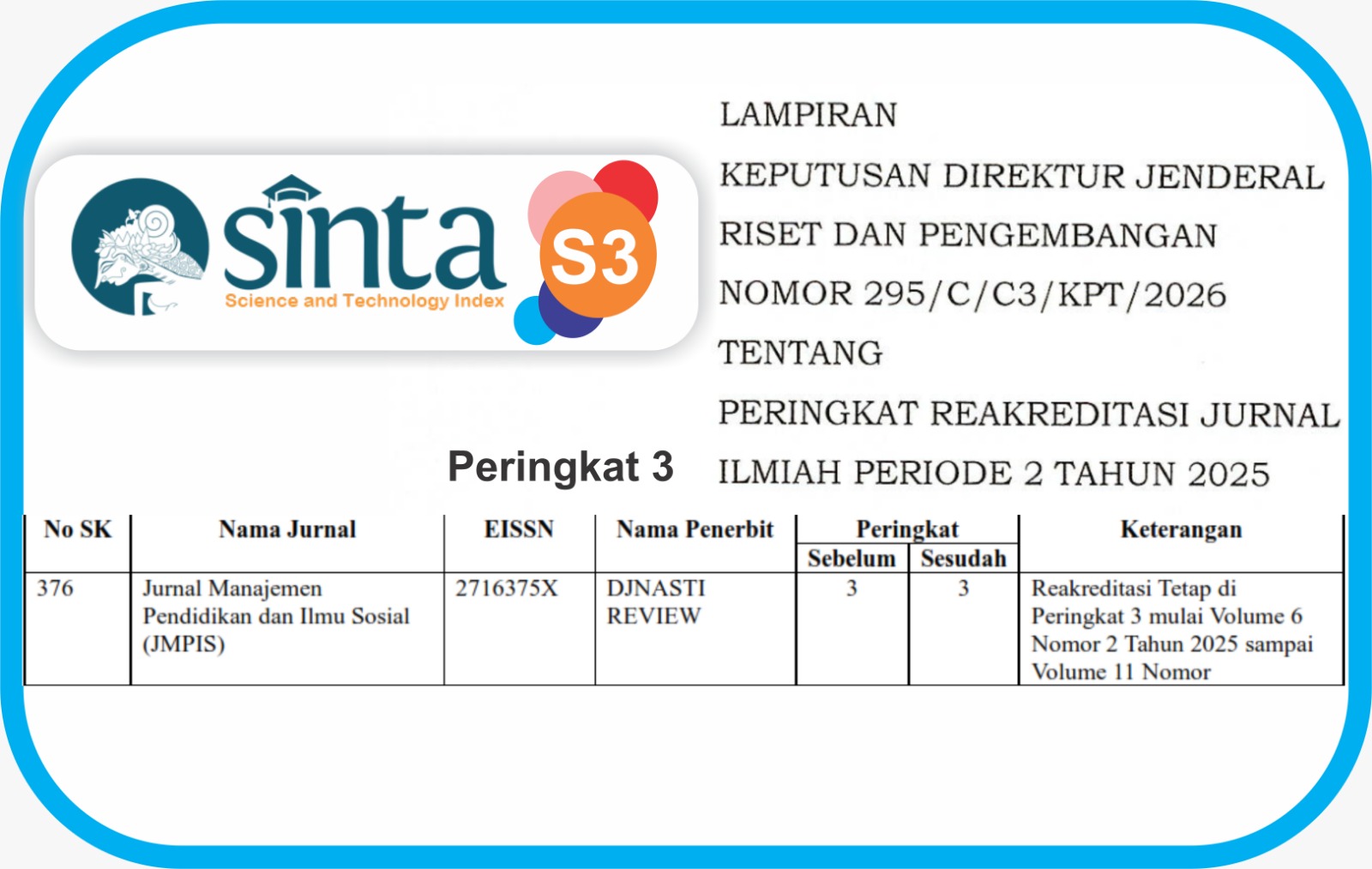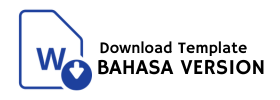Validitas Konstruk dan Reliabilitas Self Regulated Learning Assessment (SRLA)
DOI:
https://doi.org/10.38035/jmpis.v6i3.4554Keywords:
Self-Regulated Learning, Validity and Reliability, Exploratory Factor Analysis, Confirmatory Factor AnalysisAbstract
Assessment (SRLA) dalam mengukur berbagai dimensi pembelajaran mandiri di kalangan mahasiswa. SRLA mencakup aspek kognitif, metakognitif, perilaku, motivasi, emosional, kontekstual, dan kontrol kehendak. Setelah validasi ahli dan revisi selanjutnya, Exploratory Factor Analysis (EFA) dan Confirmatory Factor Analysis (CFA) dilakukan dengan menggunakan SPSS dan AMOS untuk mengkonfirmasi struktur faktor dan kecocokan model. Hasilnya menunjukkan indeks kecocokan model yang kuat dan faktor pemuatan yang tinggi untuk semua dimensi. Analisis reliabilitas menggunakan Cronbach's Alpha menghasilkan nilai 0,909, menunjukkan konsistensi internal yang sangat baik. Temuan ini menunjukkan bahwa SRLA adalah alat yang kuat, valid, dan dapat diandalkan untuk menilai pembelajaran yang diatur sendiri dalam konteks pendidikan tinggi, memberikan wawasan yang berharga bagi lembaga pendidikan untuk meningkatkan keterampilan belajar mandiri dan keberhasilan akademik siswa.
References
Alam, A., & Mohanty, A. (2024). Framework of Self-Regulated Cognitive Engagement (FSRCE) for sustainable pedagogy: a model that integrates SRL and cognitive engagement for holistic development of students. Cogent Education, 11(1). https://doi.org/10.1080/2331186x.2024.2363157
Beribisky, N., & Cribbie, R. A. (2024). Equivalence Testing Based Fit Index: Standardized Root Mean Squared Residual. Multivariate Behavioral Research, 1–20. https://doi.org/10.1080/00273171.2024.2386686
Diningrat, M., Marín, V. I., Bachri, B. S., & Wahyuda, S. (2024). Students’ Self-Regulated Learning Strategies in the Online Flipped Classroom. Journal of Educators Online, 21(3). https://doi.org/10.9743/jeo.2024.21.3.4
Dufour, G. K., Yun, S. H., & Fiorini, L. (2024). Using an Online Measurement Data Management Platform to Improve Survey Response Rates in a Community Sexual Assault Centre. Journal of Evidence-Based Social Work, 1–18. https://doi.org/10.1080/26408066.2024.2446935
Finch, W. H. (2023). A Comparison of Methods for Determining the Number of Factors to Retain with Exploratory Factor Analysis of Dichotomous Data. Psych. https://doi.org/10.3390/psych5030067
Li, S., Du, H., Xing, W., Zheng, J., Chen, G., & Xie, C. (2020). Examining temporal dynamics of self-regulated learning behaviors in STEM learning: A network approach. Computers in Education, 158, 103987. https://doi.org/10.1016/J.COMPEDU.2020.103987
Masaki, F. (2023). Self-regulated Learning from a Cultural Psychology Perspective: Shifting from Strategy to Process with the Trajectory Equifinality Approach. Human Arenas, 1–19. https://doi.org/10.1007/s42087-023-00326-w
Meerullah, N. A., Khan, M. A., & Tareen, W. (2024). Key Factors in Undergraduate Students Subject Selection: A Case Study at the University of Baluchistan. Journal for Social Science Archives, 2(2), 341–350. https://doi.org/10.59075/jssa.v2i2.65
Mubango, H., & Ngirande, H. (2024). Self-Regulated Learning: Time Management in a Blended Learning Environment for Student Academic Performance. https://doi.org/10.5772/intechopen.1006068
Ortube, A. F., Panadero, E., & Dignath, C. (2024). Self-Regulated Learning Interventions for Pre-service Teachers: a Systematic Review. Educational Psychology Review, 36(4). https://doi.org/10.1007/s10648-024-09919-5
Saqr, M., & López-Pernas, S. (2024). Mapping the self in self?regulation using complex dynamic systems approach. British Journal of Educational Technology. https://doi.org/10.1111/bjet.13452
Self-Regulated Learning. (2023). Advances in Educational Technologies and Instructional Design Book Series, 388–414. https://doi.org/10.4018/978-1-6684-8292-6.ch020
Setyaedhi, H. S. (2024). Comparative Test of Cronbach’s Alpha Reliability Coefficient, Kr-20, Kr-21, And Split-Half Method. Journal of Education Research and Evaluation. https://doi.org/10.23887/jere.v8i1.68164
Taranto, D. (2024). A Sustainable Approach to Teacher Professional Development on Self-Regulated Learning (SRL) Implementation. Discourse and Communication for Sustainable Education, 15(1), 109–126. https://doi.org/10.2478/dcse-2024-0008
Tinajero, C., Mayo, M. E., Villar, E., & Martínez-López, Z. (2024). Classic and modern models of self-regulated learning: integrative and componential analysis. Frontiers in Psychology, 15. https://doi.org/10.3389/fpsyg.2024.1307574
Ventura-León, J., Lluncor?Vasquez, A., & Chuquillanqui?Silva, M. (2024). A computer tool for Aiken’s coefficients calculation: Applications in clinical and research settings. Journal of Evaluation in Clinical Practice. https://doi.org/10.1111/jep.14134
Downloads
Published
How to Cite
Issue
Section
License
Copyright (c) 2025 Cristin Mutiara Damanik, Rita Eka Izzaty

This work is licensed under a Creative Commons Attribution 4.0 International License.
Hak cipta :
Penulis yang mempublikasikan manuskripnya di jurnal ini menyetujui ketentuan berikut:
- Hak cipta pada setiap artikel adalah milik penulis.
- Penulis mengakui bahwa Jurnal Manajemen Pendidikan dan Ilmu Sosial (JMPIS) berhak menjadi yang pertama menerbitkan dengan lisensi Creative Commons Attribution 4.0 International (Attribution 4.0 International CC BY 4.0) .
- Penulis dapat mengirimkan artikel secara terpisah, mengatur distribusi non-eksklusif manuskrip yang telah diterbitkan dalam jurnal ini ke versi lain (misalnya, dikirim ke repositori institusi penulis, publikasi ke dalam buku, dll.), dengan mengakui bahwa manuskrip telah diterbitkan pertama kali di Jurnal Manajemen Pendidikan dan Ilmu Sosial (JMPIS).











































































